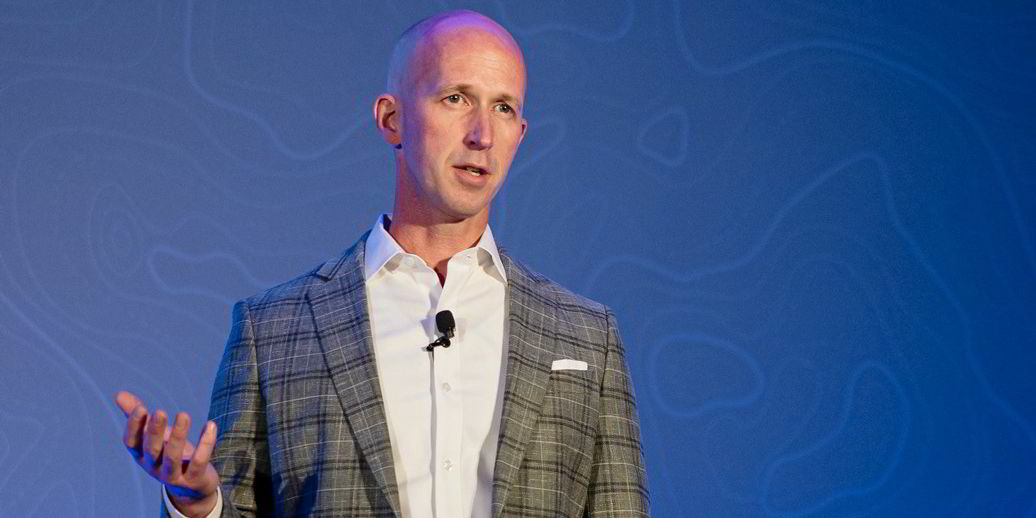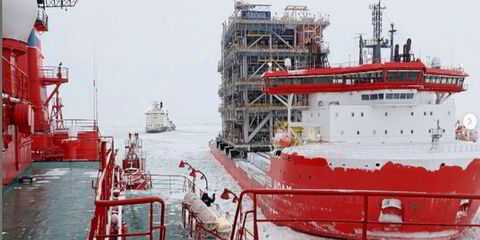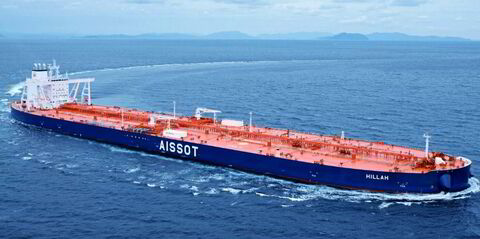You do not have to be a maritime technology insider to know that Veson Nautical is hungry for growth.
But where does the Boston software-as-a-service see its next focus of growth as it seeks to leverage its latest string of acquisitions?
President Sean Riley said it is the environmental space in which the company is investing the most.

“We can’t have a conversation with any client without them wanting to talk about environmental, decarbonisation and all the assorted factors that go around that,” he told TradeWinds.
Riley, who is also the chief operating officer, described carbon decision-making as a key pillar of future growth.
At a time when maritime technology companies are facing more discerning capital that has led experts to expect consolidation in a crowded field of companies struggling to secure customer revenue, Veson stands apart in the eyes of industry experts.
Its solid customer base has allowed it to play the role of consolidator, with April’s acquisition of VesselsValue following the purchases of Oceanbolt and Q88.
The John Veson-led company is best known for its integrated maritime operations system that serves as a voyage management platform for shipowners, operators, charterers and traders, and its vision has long been for that platform as a one-stop digital workplace for bulk commodities, both wet and dry.
Jochem Donkers, a maritime technology specialist who tracks the industry for Skysail Advisors, described Veson as a “cornerstone” in digital tech for shipping.
Annual freight traded: $109bn
Vessels covered by platforms: 77,000+
Annual commercial voyages managed: 165,000+
Users: 38,000+
Employees: 450+
“They’re probably the only real mature player in this space,” he told TradeWinds. “Practically, in every single shipping company, they’ve got a decent foothold. And if you come up with any other tech solution, the first question you’ll be asked is, ‘Great product. Will integrate with Veson?’ ”
Although Riley said Veson is beyond the need for outside finance for growth like other maritime software firms, he describes the outfit as an “awkward teenager” rather than a mature company.
“We’ve passed some of the teething stages of smaller businesses, where we’ve found product-market fit and we have a volume of customers at a reasonable scale, and so the viability of our business is not in doubt for the foreseeable future, whereas start-ups always face those challenges,” he said.
“That said, as an awkward teenager, we’re still trying to maintain growth.”
1979: Michael Veson founds Veson Inc and introduces automated port-to-port distance tables.
2003: His son John co-founds Veson Nautical with Eva Douzinas and acquires Veson Inc assets. John Veson remains Veson Nautical’s chief executive.
2021: Veson Nautical acquires Oceanbolt, a maritime data intelligence platform for bulk commodities.
2022: The company buys Q88, a vessel documentation platform.
2023: Veson acquires VesselsValue, a ship valuation and data firm, and Shipfix
And that includes testing its parents — the market — with different products.
Asked to describe the company’s next growth moves, Riley pointed to three areas on a path that is driven by customer needs.
The first is data. That has driven Veson’s recent acquisitions of software platforms, and the company is still working on ways to bring those datasets to the fingertips of the users of its lynchpin integrated maritime operations system.
“Our clients want not just software workflow, but they want data within that workflow, and they want information and context to guide that decision-making,” he said.
This includes bringing in new data sets or combining new data with existing ones to create new sets.
Another key initiative is what Riley described as the next iteration of Veson’s product platform, aimed at connecting the players in the maritime ecosystem.

But he said the biggest area for the future is environmental. While a major focus is aiding customer decision-making related to shipping’s entry into the European Union’s Emissions Trading System on 1 January, Riley said that is just the start.
The company has just announced an emissions expense settlement workflow tool, which allows users of its integrated maritime operations system to weigh the commercial viability of shipping contracts based on their exposure to carbon costs under the ETS.
Veson has also used VesselsValue data to allow users to see how voyages affect a vessel’s rating on the Carbon Intensity Indicator, an International Maritime Organization regulation that grades ships based on their operational carbon emissions.
Riley said that as a software provider, Veson’s role is to help clients assess the economic impact of environmental factors on the decisions they make.
He said some data on emissions in the maritime market can be hit or miss, so part of Veson’s focus is on more data and better accuracy. And while shipping remains reticent to share private commercial data, it is different when it comes to environmental data.
“On environmental things, there’s a much greater willingness for clients to collaborate around sharing that data,” he said.





